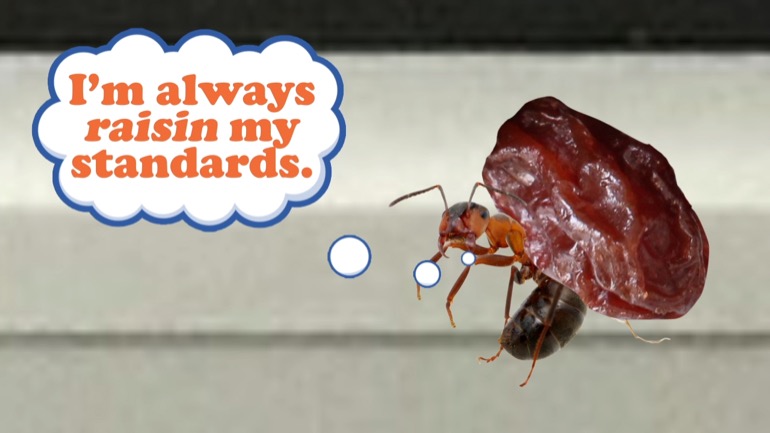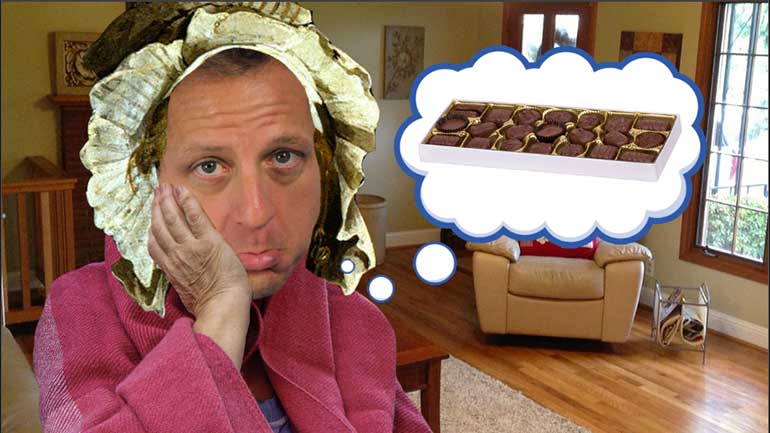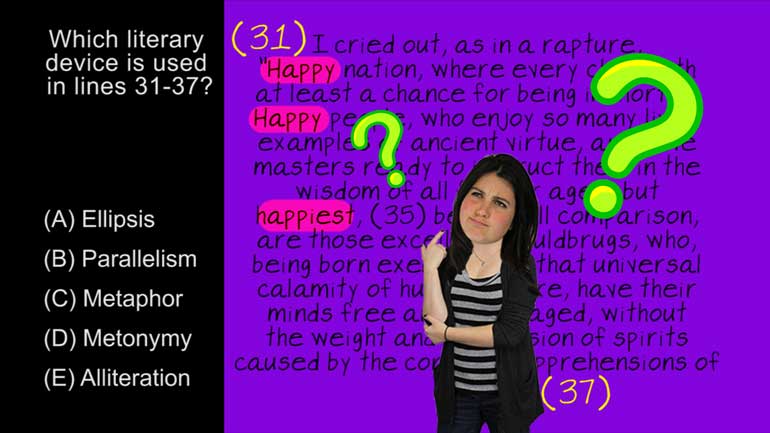ShmoopTube
Where Monty Python meets your 10th grade teacher.
Search Thousands of Shmoop Videos
Computer Science: Doubles and Ints 17 Views
Share It!
Description:
Doubles and ints. At first glance, it may look like this video will be about baseball and football statistics. But they're actually computer science terms, referring to basic data structures that... hold numbers. Awww. Feel the love.
Transcript
- 00:00
doubles in ints. well, this is Macon the month, life's pretty good in
- 00:08
his closet full of clothes but Macon's noticed lately that the owners of his [moth on sweater]
- 00:13
closet don't really know how to keep things organized. it's hard to enjoy a
- 00:18
dinner of pink wool cardigan on top of a shoe organizer. make it a sophisticated
- 00:24
he likes his meals right off the rack. why is he such an organization nut? well
Full Transcript
- 00:30
because he's a computer scientist moth. and when you get right down to it a
- 00:34
closet is a lot like a data structure in computer science, or a piece of memory
- 00:40
set aside to hold some specific amount of data. just like the different spaces
- 00:45
in the closet different types of data structures need different amounts of [closet organized into sections]
- 00:49
space. you can't exactly stuff a ball gown into a shoebox after all ,and you
- 00:54
definitely can't stuff an object into an in.t what in the world is an INT? well one
- 00:59
of these guys- we'll get to it in a sec. all right now if we want to complete
- 01:03
this metaphor Macon's code closet would look something like this. we aren't gonna
- 01:09
focus on those sweater shoes and whatever random things fit into
- 01:12
miscellaneous. well today's all about shirts and pants or ints and doubles.
- 01:17
well ints and doubles are basic data structures in computer science and all
- 01:21
they do is hold numbers. Computers love numbers way more than making love's [numbers crowded together]
- 01:25
noshing on our mom's most expensive casual wool scarf. because they store
- 01:31
numbers in memory computers can only set aside so much space for each number.
- 01:36
which means that numbers can only be so big or so small which is part of the
- 01:40
reason java has different memory types. numbers can also either have a decimal
- 01:45
point or not and well first up integers. integers are usually considered the most [decimals pictured]
- 01:51
important number type according to computers. these are the same as integers
- 01:55
in math class. positive and negative numbers that don't have any decimals
- 02:00
attached the integers usually take up either two
- 02:04
or four bytes in computer memory which means that they can get up to either
- 02:08
about thirty two thousand or two million. in Java we're working with four byte.
- 02:13
versions well you can make an int by writing int variable name equals the
- 02:19
number and Java is gonna take that number without the decimals into the [int variables listed]
- 02:23
four bytes of memory it uses for any integer. well try to assign a number like
- 02:27
four million to an int and you'll get nothing but errors. well if you need more
- 02:32
space doubles are for both you and Macon. these number types like pants take up
- 02:39
way more space than int -double the space by some counts
- 02:43
well doubles need to be huge because they handle floating-point numbers, which
- 02:49
means decimal numbers, in the math case. well doubles can be written in stored
- 02:54
like this- another variable is set to the double value of six. well all that extra
- 03:01
space makes those variables nice and wrinkle free which means better grub for [clothes in boxes]
- 03:06
Macon. so if doubles can store so much more than ants why even bother with
- 03:12
integers at all? when we've got two reasons .first only use what you need
- 03:17
when making flies into a new closet and sees a giant buffet of t-shirts and
- 03:22
jumpsuits, well he needs to be careful only to eat what he needs or the owners
- 03:27
of the closet will get wise and decide to fumigate ,making wants to live and
- 03:32
procreate you know giggity, so what well he needs to eat a normal amount .in the [ moth in a closet]
- 03:37
same way you should only use the amount of space you need. if you're saving
- 03:42
someone's age, well you probably only need intz unless that person is under
- 03:47
ten and really wants you to remember that they're actually already halfway to
- 03:50
their next birthday. all right well even if you do need
- 03:53
numbers with decimals sometimes it's better to use integers anyway .if you
- 03:57
remember from math class decimal point values are equal to fractions. computers
- 04:01
don't use decimals which is base 10. they use binary .when converting between [equations]
- 04:07
decimal and binary you can sometimes lose values so the result isn't exactly
- 04:12
the same as what you've wanted it to be. take money for example
- 04:15
well technically doubles make more sense because there's a decimal point but
- 04:20
because we know that we can only break a dollar down into hundreds which are
- 04:24
pennies by the way well we can just represent it in ints so that we don't end
- 04:29
up losing any valuable Linkens. all right well a couple of pennies might not sound
- 04:33
like much to you but to Macon in well that's a year supply of food. someone who [moth near coat]
- 04:38
doesn't decide to go on a silk only diet.
Up Next
Just as you move your furniture into a new house before spending the night, you’ve got to spend a little time setting up your environment when yo...
Related Videos
When you're about to marry the love of your life, not many things could stop you. However, finding out that your future hubby is keeping his crazy...
Here at Shmoop, we work for kids, not just the bottom line. Founded by David Siminoff and his wife Ellen Siminoff, Shmoop was originally conceived...
ACT Math: Elementary Algebra Drill 4, Problem 5. What is the solution to the problem shown?
AP® English Literature and Composition Passage Drill 1, Problem 1. Which literary device is used in lines 31 to 37?




